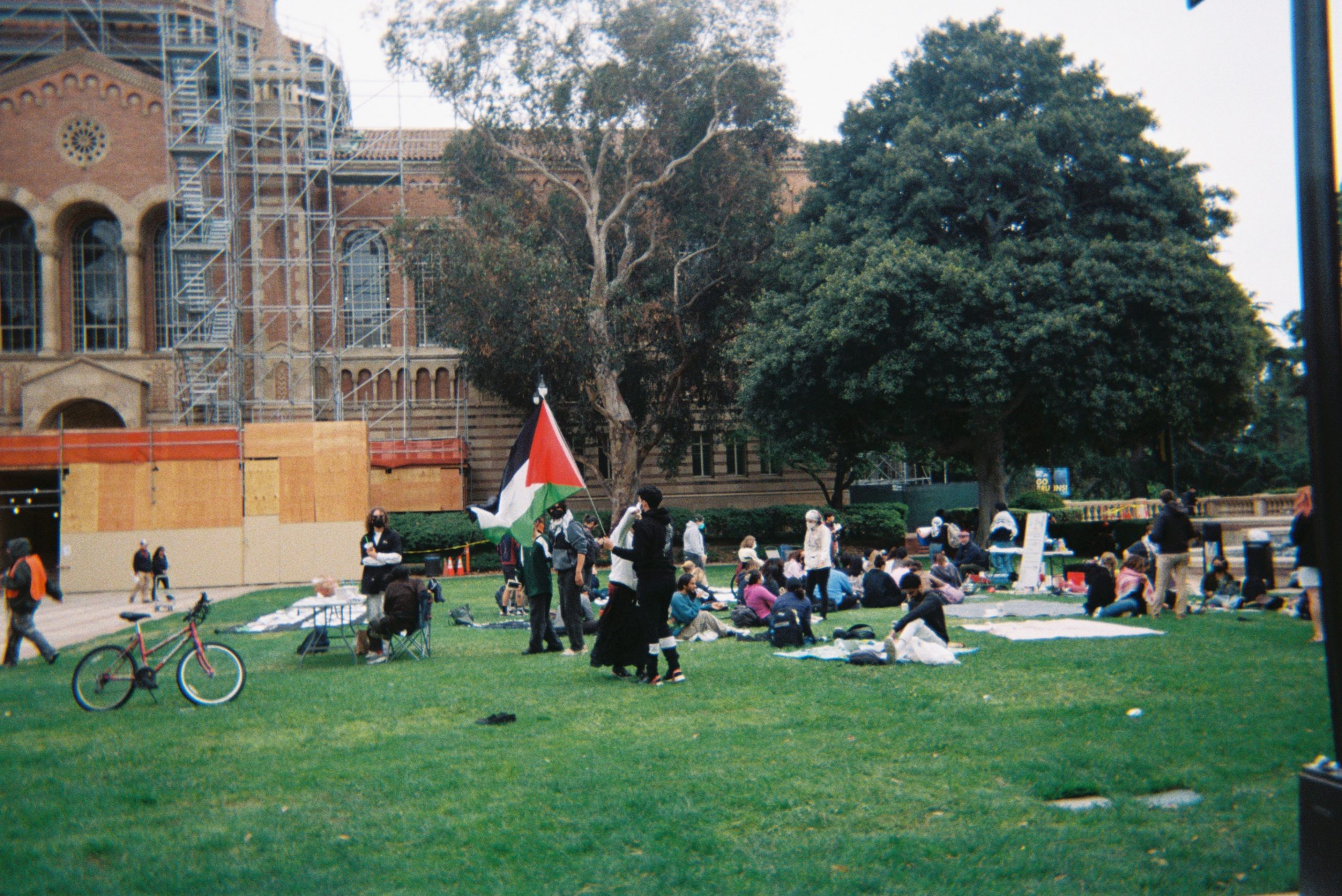Kidmin Bellin/OutWrite
Content warnings: violence, including police violence
Since April, college students in the United States and abroad have been protesting their universities’ financial and institutional ties to Israel in response to its ongoing genocide of Palestinian people. During this time, pro-Palestine rallies and encampments have formed across many American college campuses. As tensions continue to develop, university administrations throughout the U.S. have called upon police to forcefully remove many of these encampments.
On April 30th, Zionist counter-protesters attacked the encampment at UCLA with fireworks, chemical sprays, and bats. The attack went on for hours before campus police and security made any attempt to diffuse the situation. In response, Chancellor Gene Block announced that the encampment needed to end, alleging that its removal would protect and ensure the safety of students. In Block’s explanation, he said:
“Indirectly, violence related to the encampment led to the closure of academic buildings and the cancellation of classes. And frankly, hostilities were only continuing to escalate.”
Instead of directing the police to protect these students and arrest the attackers, UCLA made an announcement two days later in which it blamed the encampment for indirectly leading to the attack and consequently ordered its removal, resulting in over 200 arrests.
The act of protest is one of risk. The university’s justification for sweeping the encampment on the basis of being disruptive overlooks the fact that the disruption was intentional. On May 2 — the night that police forcibly destroyed the encampment — 210 arrested individuals were given a chance to walk away, but didn’t. They chose to remain because this act of resistance is the greatest power they have as students and civilians to affect this cause: the power to gain attention and support from news outlets and community members, as well as to expose the brutality of the police and the hypocrisy of the university.
Too much of the media coverage and discussion around these protests is focused on whether or not they were lawful, instead of dissecting why these protests initially took place. Why are these students defying school policies? Defying the police? Why are they choosing to be disruptive? They’re doing this because the University of California system invests $32 billion in businesses and weapon manufacturers that offer financial and military resources to Israel. With our tuition funding this war, what else are we supposed to do to make any kind of a difference? To make our voices heard?
Regardless of universities’ values like student activism, debate, and justice, they are ultimately business-minded institutions. Their decision-making concerns financial security more than it does moral or ethical reasoning. That is why so many universities invest in areas that contradict their declared values, such as fossil fuels. After all, it wasn’t until 2022 that the University of California stopped investing in fossil fuel companies (after years of similar student protests and bad press).
One reason the UC system is unrelenting in their support of Israel, even after these protests across their campuses, is that they are profiting from these investments; these Israeli companies are continually making strong profits. And unlike divestment from fossil fuels, divestment from Israel is far more socially and politically polarizing. If the UC was to announce a plan to divest, they would receive immense backlash from the opposing side, putting the university in a tough position with major donors and alumni who could choose to withdraw their financial support. And with general criticisms of Israel occasionally overshadowed and countered by rising cases of anti-Semitism, there is an added responsibility to ensure the Jewish student body feels safe. As a Jewish student myself, I understand and sympathize with any student who is receiving hate or threats due to their religion. Unfortunate cases of anti-Semitism, however, should not override the actual intention of this movement or its criticism of the Israeli government. Anti-Zionism is not anti-Semitism.
While divestment is a complicated and lengthy process, it is possible. In 1985, UCLA students and faculty protested the UC’s investment in companies doing business with South Africa’s apartheid government. An encampment took place on Dickson Court from April to June of that year. And over a year later, the protests successfully encouraged the UC to divest $3.1 billion.
Thankfully, students are determined to continue protesting. The UCLA Palestine Solidarity Encampment released an official statement on April 30, urging students to remain hopeful, reminding everyone, “UCLA has divested before and will divest again.”
This piece draws on reporting by ABC News, the New York Times, the ACLU of Southern California, Reuters, and the Daily Bruin.
Credits:
Author: Kidmin Bellin (Guest Author)
Photographer: Kidmin Bellin
Copy Editors: Dalia Villalobos Jimenez (She/Her), Gracie Bitting (She/Her)

